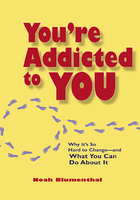
What does it mean to be addicted to yourself?
People use the word addiction to describe a variety of behaviors and conditions. There are alcoholics and shopaholics. There are drug addicts and sex addicts. There are compulsive gamblers and compulsive shoplifters. People say they are addicted to food or fitness, chocolate or basketball. But what does it really mean to be addicted to yourself?
There are many different addictions, some of which (alcohol, drugs, gambling, etc.) can destroy people’s lives. This book is not meant to be a substitute for treatment of clinical addictions. The addictions I discuss in these pages are behaviors you exhibit on a daily basis. They are your habits and routines. They are the actions you take with your coworkers, your spouse, and your children. They are the behaviors that come out when you are angry or hurt or nervous or unsure of yourself.
These behaviors come out in all areas of life. Someone criticizes you and you turn silent. Perhaps you know that you should try to understand and work to improve, but you are addicted to your silent, cold response. Another time your spouse leaves the kitchen a mess for what seems like the tenth time this week. You may know that yelling about it won’t help the situation or your relationship, but you do it anyway. When you go into work you find several co-workers congregated in an office complaining about the new marketing strategy. Maybe you realize that you’re only making the situation worse by joining in, but it feels so natural you can hardly help yourself.
Whatever the behaviors are that you wish to change, you may not feel like an addict. You are certainly very talented in many ways and may be an exemplary parent, spouse, leader, and friend. Perhaps you are on the verge of being a perfect ten, if only you quit being so accommodating, paid more attention to your kids, or did a better job of delegating. We all have ways that we can improve ourselves.
Have you ever wondered why self-help is one of the fastest growing industries? Why are there so many books to help people change themselves? Is it that people have so many things that they want to change, or is it that we are simply not very good at changing? At the time of this writing Amazon.com had over 170,000 listings for “diet.” Yet, we certainly are not a particularly thin nation. There were over 120,000 items under “leadership.” Walk into any corporate executive’s office, and you are bound to find a handful, if not dozens, of leadership books. Imagine what work would be like if all of the corporate executives in the country actually practiced half of the leadership skills described in the books they read.
Why don’t these leadership and diet books work? Because they provide new behaviors and supply wonderful ideas, but they don’t help us address our addictions to our behaviors. We have had our behaviors shaped, molded, and reinforced thousands of times over the course of our lifetimes. We have been conditioned to act in a certain way when faced with certain types of situations. We can’t simply come up with something better and turn off the old behavior. It takes time to unlearn the old behavior and to learn to replace it with a new one.
Steven is a learning and development professional who works for a Fortune 500 company. He is also a recovering alcoholic. When I asked him how long it had been since his last drink, he replied, “Every day is a new challenge.” He wasn’t being vague; he was telling me that it didn’t matter how long it had been. The power of the addictive behavior is so strong that if he isn’t vigilant every day, it could come back to overwhelm him. Later he shared with me that it had been 17 years since his last drink. Your behavioral addictions may not take a lifetime to overcome. However, the example of alcoholism presents a valuable lesson that a deeply ingrained behavior doesn’t change overnight.
The fact remains that you can change. Whether you are trying to change something for the first time or you are struggling with something that you have tried to change many times in the past, you can make the change you desire. People have difficulty with change because they don’t know how to change. They know what they want to do, but they don’t know how to adjust when they get into situations that bring out their bad habits. The truth is that you can change if you have an effective plan for how to do so. This book is dedicated to helping you lay out that plan and break your self-addiction.